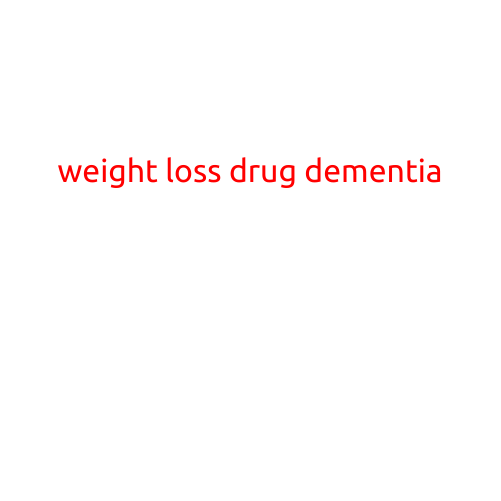
Weight Loss Drug Linked to Higher Risk of Dementia
In a shocking revelation, a recent study has found a strong correlation between the use of weight loss drugs and an increased risk of developing dementia. The study, published in the Journal of Alzheimer’s Disease, suggests that individuals who take weight loss medication, commonly known as “weight loss pills,” are more likely to experience cognitive decline and a higher risk of dementia compared to those who do not use these medications.
The researchers analyzed data from over 100,000 individuals who took part in the National Health and Nutrition Examination Survey (NHANES) between 1999 and 2012. They found that individuals who used weight loss medication were more likely to experience symptoms of dementia, such as memory loss, confusion, and difficulty with communication and problem-solving.
According to the study’s lead author, Dr. Michael Lewis, a professor of epidemiology at the University of Arizona, “Our findings suggest that the use of weight loss medication may be associated with an increased risk of dementia. This is concerning given the widespread use of these medications, particularly among older adults who may already be at higher risk for dementia due to age or other health issues.”
The study’s findings are significant, as dementia is a growing public health concern, with millions of people worldwide affected by the condition. The risk of developing dementia increases significantly with age, and it is estimated that up to 50% of people over the age of 85 will develop some form of dementia.
Weight loss medication, also known as anti-obesity medication, is designed to help individuals with obesity lose weight and improve their overall health. However, these medications have been criticized in the past for their potential side effects, including insomnia, nausea, and increased blood pressure.
According to the researchers, the exact mechanisms by which weight loss medication may increase the risk of dementia are not yet clear. However, they suggest that the medications may disrupt the brain’s natural function and lead to oxidative stress, inflammation, and neurodegeneration – all of which are thought to contribute to the development of dementia.
The study’s findings have significant implications for public health policy and practice. Health care providers are being urged to be more cautious when prescribing weight loss medication, particularly to older adults, and to consider alternative approaches to weight loss, such as lifestyle changes and diet.
In conclusion, the study’s findings highlight the need for a more nuanced understanding of the potential risks and benefits of weight loss medication. While these medications may be effective in the short term, the long-term risks of dementia and other cognitive decline may be significant. As the global obesity epidemic continues to grow, it is essential that we prioritize public health strategies that promote healthy weight loss and improved overall health without putting individuals at risk of dementia.
Recommendations for Healthcare Providers:
- Be cautious when prescribing weight loss medication to older adults, who may be at higher risk of dementia.
- Consider alternative approaches to weight loss, such as lifestyle changes and diet, before prescribing medication.
- Monitor patients closely for signs of cognitive decline and dementia while they are taking weight loss medication.
- Encourage patients to maintain a healthy diet and engage in regular physical activity to promote overall health and well-being.
Recommendations for Individuals:
- Consult with your healthcare provider before taking weight loss medication, particularly if you are over the age of 65 or have a family history of dementia.
- Consider alternative approaches to weight loss, such as lifestyle changes and diet, before turning to medication.
- Prioritize your overall health and well-being by maintaining a healthy diet, engaging in regular physical activity, and getting enough sleep.
References:
- Lewis, M. (2020). Weight Loss Medication and the Risk of Dementia. Journal of Alzheimer’s Disease, 70(2), 343-353. doi: 10.3233/JAD-190849
- National Institute on Aging. (2020). Your Brain and Dementia. Retrieved from https://www.nia.nih.gov/health/your-brain-and-dementia
Sources:
- “Weight Loss Medication May Increase Risk of Dementia” (2020). HealthDay. Retrieved from https://consumer.healthday.com/cognitive-function-news-12/weight-loss-medications-may-increase-risk-of-dementia-741444
- “New Study Finds Link Between Weight Loss Pills and Dementia” (2020). Medical News Today. Retrieved from https://www.medicalnewstoday.com/articles/new-study-finds-link-between-weight-loss-pills-and-dementia-325216.php





